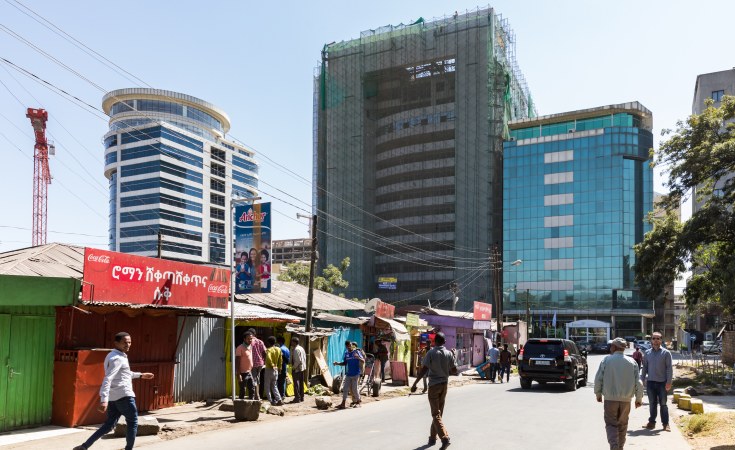With 40 countries on the waiting list, Egypt and Ethiopia's entry into BRICS marks another notch for Beijing's geopolitical expansion.
The decision to expand the BRICS, despite initial scepticism from South Africa, Brazil and India, is a significant success for China. It has demonstrated its global diplomatic influence, particularly in admitting four Middle Eastern states, including Egypt, Saudi Arabia and the United Arab Emirates, all previously perceived as close allies of the US. It has brought in friends like Ethiopia and, Iran, the fourth Gulf state, and has omitted others, such as Indonesia and Nigeria, who might be more sceptical of China's influence. With the 2024 summit to be held in Russia, the group's pro-Beijing geopolitical orientation is fairly clear.
China remains by far the largest economy within the group, and the BRICS feels increasingly like a group of its friends. But the meetings have a particular significance for Africa.
For one, the summit itself took place in Africa. Neither the G7 nor G20 have ever met in Africa. African countries have regularly been invited to attend summits elsewhere, in Washington, Paris, Tokyo, Beijing, London, but the symbolism of coming to Africa is important. It is a major achievement for South African diplomacy that they successfully organised this series of summit-level meetings and that President Xi attended in person.
Secondly, Africa's participation in a major global grouping has been strengthened by the addition of Ethiopia and Egypt (the latter which, as an AU member, counts both for Africa and the Middle East). Although other major African economies - notably Nigeria and Algeria, where President Tebboune had made it a top foreign policy priority to be admitted - were omitted, President Ramaphosa underlined that this was only a first phase of enlargement and others would follow. The real criteria for future accessions remain obscure, but China's aim seems to be to expand the group further and, therefore, attract as many aspirant members as possible.
Thirdly, for many African governments, the idea of an alternative source of economic support to the traditional international financial institutions is very attractive. Frustration has been growing that Western countries' response to their demands for greater representation, through the Bridgetown Initiative for example, has been slow and lacking substance. The failure of the French Summit on climate finance in June this year to make substantive progress reinforced this: the main story was China's agreement to finally cooperate with re-scheduling Zambia's debt. By contrast, the BRICS New Development Bank has opened a regional office in Johannesburg, and in his comments President Xi Jinping underlined China's commitment to working with African countries to reform global institutions and bring Africa into the G20.
Finally, the event was used as a platform for Summit-level dialogues for both BRICS and China with wider African groups. The China-Africa Leaders Roundtable Dialogue on 24 August was held with thirteen African leaders representing its regional organisations, including Heads of State from Senegal, Zambia, Namibia, Djibouti, Comoros, Burundi, the Republic of Congo and Libya, and the Nigerian Vice-President. Their communique pledged Chinese support for Agenda 2063 and the African Continental Free Trade Area, and Africa's support for China's Global Development, Security and Civilisational Initiatives, as well as the one-China policy, with ritual genuflections to the UN Charter's principles of national sovereignty, territorial integrity, security and development.
Nevertheless, the meetings mark a shift in China's relationship with Africa: from providing investment and securing raw materials, though these remain important, to a greater focus on political alliances and exerting influence. Xi did not come bearing big investments - China is now more in debt collection mode - but he did offer tens of thousands of scholarships and training opportunities for Africans in China, though there may be some reluctance among African students to take them up following their grim experience there during Covid.
Perhaps for this reason Xi underscored China's political and economic solidarity with 'the Global South', manifest in an agreement to re-open China to South African agricultural exports. He emphasised repeatedly that China was an equal partner of Africa, an investor rather than donor, and a country that provided help to Africa at its time of need during the pandemic. That its direct financial support is significantly less than that of traditional donors, that it imports far less value-added African exports than the EU or US, or that its investment has loaded some African governments with levels of debt that strangle their development, has been subordinated to the message that China treats Africa with respect and equality. It is an integral part of China's strategy to consolidate a global coalition against a still 'imperialist' West. Xi's message echoed Bola Tinubu's election slogan: 'It's our turn now.'
It is worth noting that other leaders attending the BRICS outreach event also took advantage of their presence to visit other African countries, the president of Indonesia visiting Kenya, Tanzania and Mozambique to look for closer trading relations before returning home.
So, interest in Africa is rising, even if its economy languishes. Western countries are aware of the challenge, but still struggle to respond, partly because the bar is set higher. It is mainly they, for example, who have failed to deliver the climate finance Africa was promised. The Biden Administration does have a clear strategy for Africa, and its summit last November with African leaders was a notable success. The EU also has a strategy, including the 'Global Gateway' initiative to rival China's Belt and Road Initiative. But it too often appears to be missing in action, while the G7 have been slow to press forward reform of the existing international financial institutions.
Persuading Africans that the existing world order is to their benefit will require faster, bolder and more substantive action, including both institutional reform and increased finance. Without this, the attractiveness of a Chinese-led alternative order will only increase.
Nick Westcott is Professor of Practice in Diplomacy at the Centre for International Studies and Diplomacy at SOAS, University of London.


